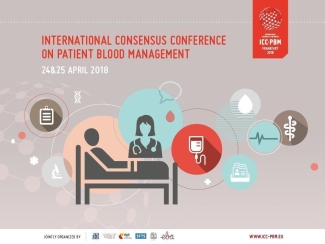Physician trainee promotes uptake of patient blood management in new publication
Thursday, January 18, 2024 Dr. Sumedha Arya
Dr. Sumedha Arya is a physician trainee with Canadian Blood Services and recipient of the Elianna Saidenberg Transfusion Medicine Traineeship Award. She is also the lead author of a publication in the peer-reviewed journal Transfusion, the Journal of AABB, about engaging patients in patient blood management (PBM) using a short, animated video. The publication had the largest number of downloads and the most online views of any PBM article in Transfusion this year! Read on as Sumedha describes the work behind the publication.

What is patient blood management and why it is important?
Patient blood management (PBM) is a patient-centred, evidence-based, multidisciplinary approach to caring for patients who might need a blood transfusion, often with a focus on the time before surgery occurs, which is known as the “perioperative period”.
The PBM key principles include preserving a patient's own blood while addressing causes of underlying anemia (for instance, iron deficiency), minimizing surgical blood loss, and promoting patient safety and empowerment. It is important because there are often safe ways to correct anemia before surgery, and many studies have shown that this improves patient outcomes. PBM is both effective and implementable, and something that patients can easily be involved with!
-
Read the full publication: Including the patient in patient blood management: Development and assessment of an educational animation tool - Arya - 2023 - Transfusion - Wiley Online Library
-
Watch the video: SMH Patient Ed Short on Vimeo
How did this research engage patients in understanding patient blood management?
In collaboration with the extremely talented Tracy Xiang, a student in the Master of Science in Biomedical Communications program at the University of Toronto (and award-winning medical illustrator), and the hospital patient blood management team, a form of character animation was used to create an educational video that would provide patient education on PBM in the preoperative setting. To make the video as clear and engaging as possible, the animations featured different patient journeys and explained the importance of addressing anemia before surgery using characters representing iron, vitamin B12, folate and hemoglobin.
Given the importance of patient empowerment as part of PBM, a survey was developed to ask patients for feedback about how this animation was received and to confirm it was informative and understandable. We did find that patients indicated a better understanding of anemia and its treatment, and the majority felt that they could follow through with their care plans after watching the video.
Who can benefit from this research and how can these findings be applied?
Both patients and healthcare providers could apply the findings from this publication, and the video is accessible online. There are so many individuals involved in a patient's care in the preoperative, operative, and postoperative setting to ensure the best outcomes, including surgeons, anesthesiologists, hematology/transfusion medicine physicians, nurses, and other allied health colleagues. And of course, there is the patient themselves!
Ideally, the conversation about addressing anemia occurs well before surgery, and so we hope that our patients and colleagues can use this video or adapt similar educational tools to promote uptake of PBM. Our goal is for patients to feel empowered and supported with their care.
What would you want patients to know about PBM?
Blood transfusion is actually one of the most common procedures done in hospital, and surgery - particularly certain types of surgery, such as cardiac procedures - can result in a degree of blood loss that requires a transfusion. Patients will often be consented for blood before surgery, which should involve a clear discussion of risks, benefits, and alternatives. However, anemia can sometimes exist before surgery, which could put a patient at higher risk for transfusion in the operative setting. This can be due to a variety of factors, including underlying illness.
Part of the PBM team's role is to see whether a patient is anemic prior to surgery, as well as get to the "why". Then, the PBM team can suggest ways to help correct anemia, and ideally avoid any unnecessary transfusions. We want patients to feel like they can ask their healthcare providers about anemia in advance of their surgery, as well as whether there are any ways to optimize them for surgery.
How has your experience as a physician trainee with Canadian Blood Services impacted your research and/or research goals for the future?
Through Canadian Blood Services, we receive the unique opportunity to understand Canada’s blood supply and recognize our dual duty to both patients and donors. By promoting PBM, I hope to contribute to the larger dialogue around appropriate transfusion strategies. Further, my experience at Canadian Blood Services has helped me appreciate the incredible individuals who support transfusion medicine throughout the country and made me better aware of potential research support and collaborations.
Canadian Blood Services – Driving world-class innovation
Through discovery, development and applied research, Canadian Blood Services drives world-class innovation in blood transfusion, cellular therapy and transplantation—bringing clarity and insight to an increasingly complex healthcare future. Our dedicated research team and extended network of partners engage in exploratory and applied research to create new knowledge, inform and enhance best practices, contribute to the development of new services and technologies, and build capacity through training and collaboration. Find out more about our research impact.
The opinions reflected in this post are those of the author and do not necessarily reflect the opinions of Canadian Blood Services nor do they reflect the views of Health Canada or any other funding agency.
Related blog posts
The transfusion medicine traineeship support administered by Canadian Blood Services was recently renamed to honour Dr. Elianna Saidenberg — an expert in hematopathology and transfusion medicine and an inspirational physician and educator — who passed away in late 2019.
Red blood cells are like delivery trucks that deliver oxygen to the vital organs in our body. Iron is the flatbed of the truck which holds the oxygen in place. Our body loses iron when we lose blood, and women are at the highest risk for low iron since blood is lost monthly during childbearing years. Dr. Heather VanderMeulen’s joint 3rd place entry to our Lay Science Writing Competition dissects these issues.
On April 24-25, 2018 the International Consensus Conference on Patient Blood Management (ICC-PBM2018) took place in Frankfurt, Germany.


